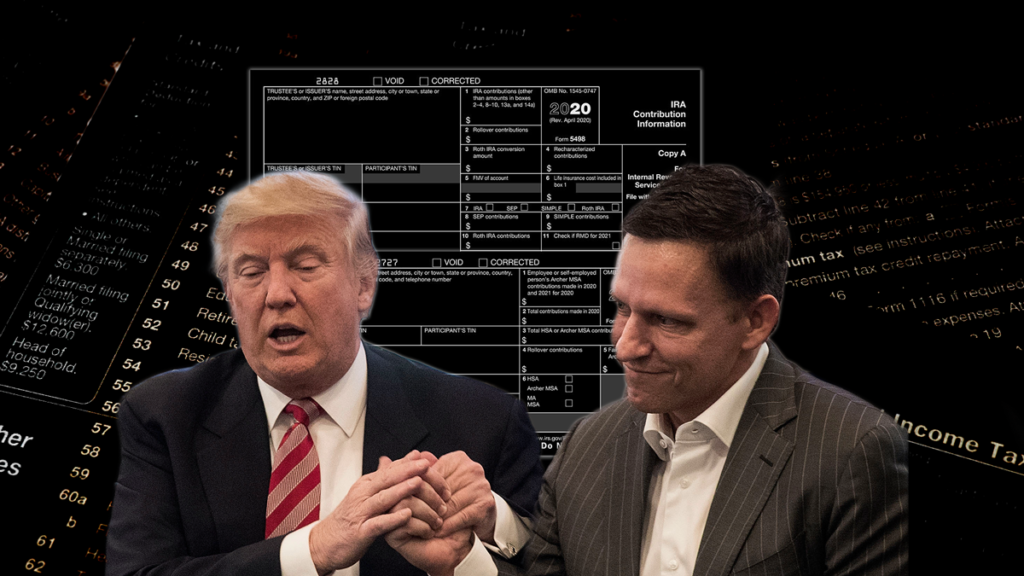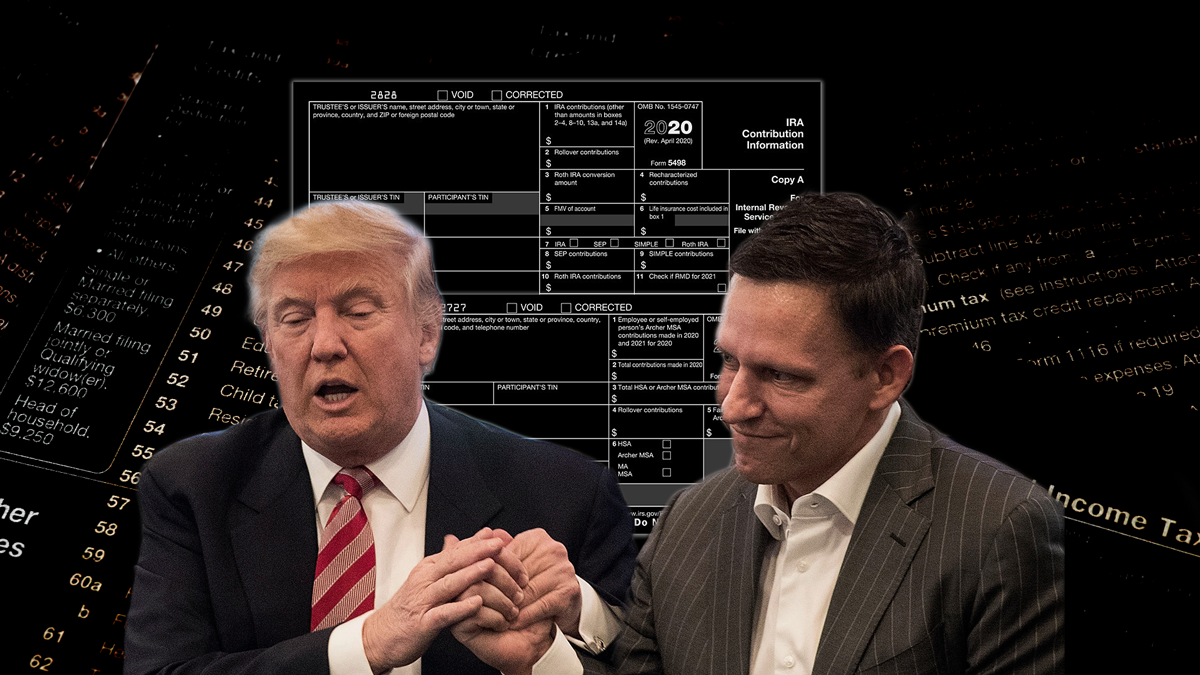
Photo Collage / Lynxotic
House Bill Would Blow Up the Massive IRAs of the Superwealthy
Legislation currently making its way through Congress would take a sledgehammer to the massive individual retirement accounts built up tax-free by a select group of the ultrawealthy.
The proposal, which is part of the infrastructure and tax package advancing in the House, targets the jaw-dropping IRAs accumulated by multimillionaires and billionaires such as tech investor Peter Thiel, which were first reported by ProPublica earlier this year. Those accounts — Thiel’s alone was worth $5 billion in 2019 — have allowed some super-wealthy Americans to turn their Roth IRAs, tools meant to incentivize middle-class retirement saving, into supersized tax shelters.
ProPublica is a Pulitzer Prize-winning investigative newsroom. Sign up for The Big Story newsletter to receive stories like this one in your inbox.Series: The Secret IRS Files Inside the Tax Records of the .001%
The proposed reform, put forward by House Ways and Means Chairman Richard Neal, D-Mass., would effectively cap the total amount someone could hold in a Roth at $20 million and compel the holders of the giant accounts to withdraw anything over that limit. Separately, individuals would have to add up the balances of their retirement accounts — including Roths, traditional IRAs, 401(k)s and 403(b)s — and every year withdraw half of any amount over $10 million. The provisions would only apply to individuals with taxable income of over $400,000 or couples making over $450,000.
The reform wouldn’t affect the overwhelming majority of Americans, whose retirement savings (if they have any) are far more modest — the average Roth was worth just $39,108 at the end of 2018.
“Incentives in our tax code that help Americans save for retirement were never intended to enable a tax shelter for the ultra-wealthy,” Neal said earlier this year. “We must shut down these practices.”
Should the bill pass, it could have profound implications for PayPal founder Thiel, whose gargantuan Roth stunned lawmakers, spurring Neal to vow a crackdown. Thiel wouldn’t owe any tax up front and no early withdrawal penalties would apply, but he’d be required to move billions out of the tax-advantaged account. And any gains on investments made with that money would no longer be sheltered from taxes, potentially creating hundreds of millions of dollars in future tax liabilities.
The great appeal of the Roth IRA is that once money is inside it, any income generated — such as capital gains from selling a stock, investment interest or dividends — is tax-free, as long as the holder waits until he or she is 59 and a half to withdraw it. (Thiel hits that mark in 2027.) In a traditional IRA, by contrast, money that’s withdrawn counts as income and is taxed.
The IRA reforms are part of a slate of proposals designed to eliminate loopholes and boost tax rates on rich individuals and corporations.
Several of the changes address revelations contained in The Secret IRS Files, a series of ProPublica stories published this year that are exploring the ways the very richest Americans avoid paying taxes. Usually such efforts remain secret, but ProPublica has obtained a trove of tax records covering thousands of the country’s richest people. The records reveal not only the diverse array of tax-avoidance techniques used by the rich, but also that some of the very richest have consistently found ways to avoid taking income, so they pay little or no taxes, even as their wealth multiplied to historic levels.
The current House plan falls short of President Joe Biden’s more ambitious proposals to combat wealth inequality through the tax code. But experts say it would significantly increase the taxes paid by high-income Americans. Among other things, it would all but eliminate a major deduction created by President Donald Trump’s 2017 tax law that, as ProPublica recently reported, showered massive tax breaks on some of the richest families in the country.
Given the stakes for a small group of wealthy and powerful Americans, it’s unclear whether the IRA proposal, along with the rest of the package, will become law. It must pass the House and make it through the Senate, where it will likely need the votes of all 50 Democratic senators to pass. Capitol Hill staffers say the bill remains fluid and provisions could still be cut, added or modified.
For now, however, the proposal has alarmed those who stand to lose the most. Three tax lawyers told ProPublica that clients with giant IRAs have reached out to them, worried about the potential reforms. Already a lawyer and an accountant are offering a paid webinar that pitches strategies to help owners of large IRAs get around the proposed rules.
A spokesman for Thiel didn’t respond to a request for comment.
The tax proposals have drawn opposition from Republicans on Capitol Hill. “This is very bad news for the U.S. economy,” said Ways and Means Committee ranking member Rep. Kevin Brady, R-Texas, in an interview this week.
A budget analyst at the anti-tax Heritage Foundation specifically criticized the IRA reform proposals as “stifling retirement savings and decreasing the economy-wide investment in future productivity.”
Neal announced his plans to curb the size of mega IRAs in July following ProPublica’s story revealing how Thiel and other billionaires had amassed giant retirement accounts using techniques largely unavailable to most taxpayers. Other wealthy investors with giant retirement accounts included financier Michael Milken, Warren Buffett and executives from investment giant Bain Capital.
Neal joined his Senate counterpart, Ron Wyden, D-Ore., who had been pushing for reform of mega IRAs for years without much support from his peers.
With a multibillion-dollar tax-free account on the line, a wealthy investor might try to keep his income below the $400,000 threshold set by the proposal. In Thiel’s case, it’s not clear if that would be possible, given that he’s long reported tens of millions of dollars on his tax returns from capital gains, interest and dividends on investments he holds outside of his Roth IRA. And even if he has to withdraw billions from his Roth, he will never have to pay taxes on years of growth inside the account.
ProPublica has previously reported that several billionaires have had very little taxable income in certain years, including Jeff Bezos and Elon Musk. Musk did not respond to questions for that story and Bezos’ representatives would not designate someone to accept questions related to that story.
The proposal would also add restrictions in areas that congressional investigators have said are ripe for abuse by the wealthy: The owners of IRAs would be barred from using the accounts to either purchase certain nonpublic investments or buy stakes in companies in which they are an officer.
Thiel launched his Roth IRA by purchasing so-called founder’s shares of PayPal in 1999 when he was chairman and CEO of the company, according to tax records and a financial statement Thiel included in his application for residency in New Zealand. Securities and Exchange Commission records show he bought 1.7 million shares for $1,700, or a tenth of a penny per share. (The maximum contribution to a Roth that year was $2,000.) PayPal later told the SEC the shares were sold “below market value.”
The practice has become popular among the founders of Silicon Valley companies, who tuck shares of their startups into IRAs, often after buying them at bargain prices. This can sidestep IRA contribution limits and generate massive tax-free growth if the value of their companies explodes.
The proposal would also shut down the so-called backdoor Roth. ProPublica found that billionaires like Buffett had taken advantage of a maneuver, known as a conversion, that allows the wealthy to sidestep existing income caps to create a Roth IRA. In a conversion, the owner of a traditional IRA can transform it into a Roth by paying one-time tax on the money. Once the account is converted into a Roth, no additional income taxes are ever due. The new provision would bar conversions for individuals with income over $400,000, though the ban would not go into effect until 2031 for budgetary reasons. (Buffett previously didn’t respond to questions about his IRA.)
The proposal also has implications for the holders of giant traditional IRAs, who could suddenly owe a hefty tax bill. Money withdrawn from a traditional IRA counts as taxable income. Milken, the 1980s junk bond king who went to prison for fraud and was later pardoned by Trump, had traditional IRAs valued at $509 million at the end of 2018, according to tax records. If the law passed, Milken could face a tax bill of roughly $100 million, depending on the current size of his account. A spokesperson for Milken declined to comment.
Separately, another part of the bill would tackle the generous business income deductions granted by Trump’s 2017 tax law.
As ProPublica previously reported, the drafting of the deduction was marked by last-minute changes and a rush of lobbying dollars from corporations and the superrich. The result of its passage, confidential tax records show, was a windfall for billionaires such as media mogul Michael Bloomberg, packaging tycoons Dick and Liz Uihlein, and the Bechtel family, owners of a global engineering and construction firm.
Bloomberg received a deduction of roughly $183 million in 2018 alone as a result of the provision, while the Uihleins netted around $118 million.
Under the House proposal, the deduction would be capped at $400,000 for an individual and $500,000 for a couple, virtually wiping it out for the very rich. If such a cap had been in place in 2018, for example, the Uihleins would have gotten a deduction worth just $500,000 instead of $118 million. A competing Senate proposal unveiled by Wyden in July would go even further. A spokesperson for the Uihleins declined to comment on the proposed reforms.
On a broader level, the House plan would spell a significant tax hike on Americans earning more than $400,000, raising their individual income tax rates as well as bumping up the corporate tax rate, the first such hikes in a decade.
But despite the proposal’s ambition, critics say it misses a rare opportunity to capture the massive untaxed wealth of some of the richest individuals in history, including Bezos and Musk, who have often found ways to keep their income low.
As ProPublica reported, they and other billionaires have managed to pay little to no taxes in the past. Some have done so by pursuing the so-called buy, borrow, die strategy. By holding on to his Tesla stock but borrowing money to finance his lifestyle, Musk, for example, can avoid income that is taxable under current law. If he sticks to this strategy till death, the income tax liability on his fortune will evaporate for his heirs.
Some Democrats and policymakers had aspired to even bolder tax code changes that would have targeted the stratospheric increases in the ultrawealthy’s riches. One idea, championed by Sens. Elizabeth Warren, D-Mass., and Bernie Sanders, I-Vt., would be to levy a so-called wealth tax on billionaires’ overall holdings. Another, pushed by Wyden, would tax the annual gains billionaires logged, even if they hadn’t sold the assets. Both ideas foundered, with concerted opposition from billionaires and skittishness from Democratic centrists. Some critics point out that wealth taxes have often failed in other countries. And many policymakers believe it would be too logistically difficult to measure assets properly and enforce such a sweeping rule on gains.
Originally published on ProPublica by Justin Elliott, Patricia Callahan and James Bandler and republished under Creative Commons.
Big Tech, Economics and many other topics at our sister site: Cherrybooks on Bookshop.org
Enjoy Lynxotic at Apple News on your iPhone, iPad or Mac and subscribe to our newsletter.
Lynxotic may receive a small commission based on any purchases made by following links from this page.
